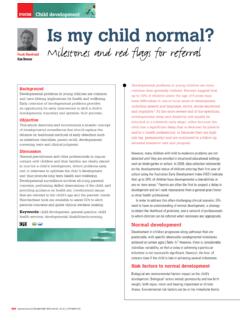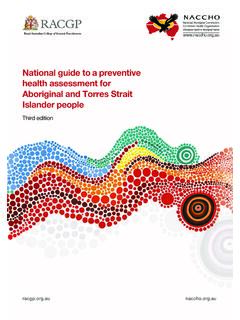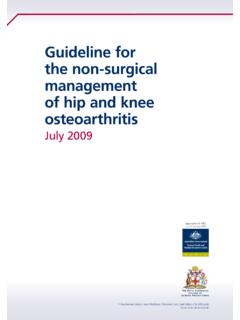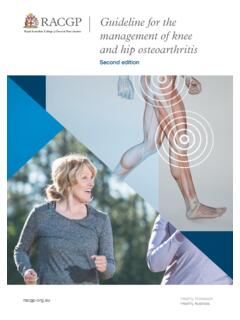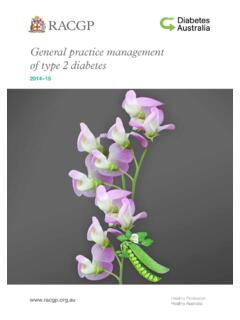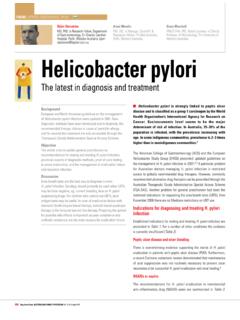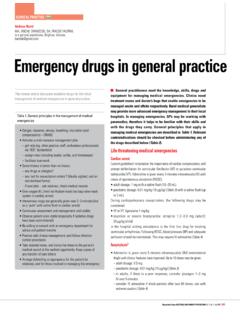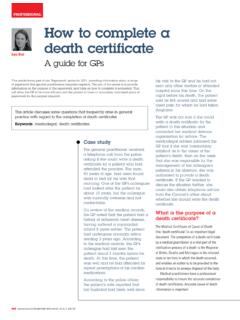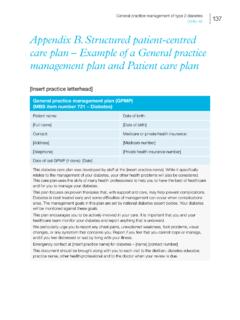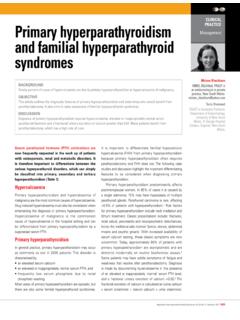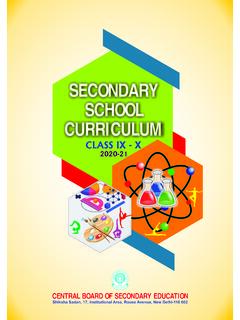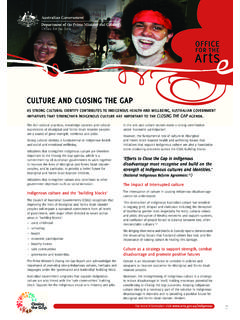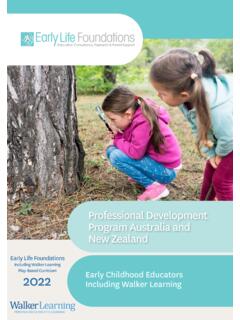Transcription of An introduction to Aboriginal and Torres Strait Islander ...
1 An introduction to Aboriginal and Torres Strait Islander health cultural protocols and perspectivesHealthy Profession. Healthy by:The Royal Australian College of General PractitionersCollege House1 Palmerston CrescentSouth Melbourne, Victoria 3205 AustraliaTel 03 8699 0414 Fax 03 8699 978-0-86906-332-3 Published May 2012 The Royal Australian College of General Practitioners 2012. All rights information set out in this publication is current at the date of first publication and is intended for use as a guide of a general nature only and may or may not be relevant to particular patients or circumstances. Nor is this publication exhaustive of the subject matter. Persons implementing any recommendations contained in this publication must exercise their own independent skill or judgement or seek appropriate professional advice relevant to their own particular circumstances when so doing. Compliance with any recommendations cannot of itself guarantee discharge of the duty of care owed to patients and others coming into contact with the health professional and the premises from which the health professional the text is directed to health professionals possessing appropriate qualifications and skills in ascertaining and discharging their professional (including legal) duties, it is not to be regarded as clinical advice and, in particular, is no substitute for a full examination and consideration of medical history in reaching a diagnosis and treatment based on accepted clinical The Royal Australian College of General Practitioners and its employees and agents shall have no liability (including without limitation liability by reason of negligence) to any users of the information contained in this publication for any loss or damage (consequential or otherwise)
2 , cost or expense incurred or arising by reason of any person using or relying on the information contained in this publication and whether caused by reason of any error, negligent act, omission or misrepresentation in the introduction to Aboriginal and Torres Strait Islander health cultural protocols and perspectivesAn introduction to Aboriginal and Torres Strait Islander health cultural protocols and perspectivesHealthy Profession. Healthy RACGP An introduction to Aboriginal and Torres Strait Islander health cultural protocols and perspectivesAcknowledgementsThe National Faculty of Aboriginal and Torres Strait Islander health would like to thank the many people who provided advice and feedback during the development of this publication. In particular, we would like to thank: Dr Elizabeth Hindmarsh, past Board member, National Faculty of Aboriginal and Torres Strait Islander health Mr Alan Brown, Board member, National Faculty of Aboriginal and Torres Strait Islander health Associate Professor Dennis McDermott, Flinders University Professor Jenny Reath, Deputy Chair, National Faculty of Aboriginal and Torres Strait Islander health Dr John Scopel, Board member, National Faculty of Aboriginal and Torres Strait Islander health Dr Keith Gleeson, member, Australian Indigenous Doctors Association Ms Marianne Gleeson Des Martin and Sharon Busby, Aboriginal health Council of Western Australia (AHCWA).
3 We also drew from resources that are made available free of charge by several organisations, and acknowledge the contribution of: The NSW Department of Community Services, for its publication Working with Aboriginal people and communities, available at Community Cultural Development NSW, whose report Respect, acknowledge, listen (2004) is available on the Australian Indigenous health InfoNet website at The Queensland Government, for the report Protocols for consultation and negotiation with Aboriginal people, available at publication was developed by Jill Dixon, National Advisor, and Lauren Cordwell, Manager, of the RACGP National Faculty of Aboriginal and Torres Strait Islander health . Healthy Profession. Healthy RACGP An introduction to Aboriginal and Torres Strait Islander health cultural protocols and perspectivesContents introduction 1 Background 1 Purpose 2 Torres Strait Islander peoples 2 Overview 2 How to use this resource 3 Related documents 3 Definitions 4 Aboriginal and Torres Strait Islander history.
4 And why it matters 6 Aboriginal Australia map 7 Before colonisation 8 Colonisation 9 Protectionism 12 Assimilation 14 The referendum 15 Self determination 15 Native title 16 Northern Territory intervention 16 Close the Gap 18 The national apology 19 Core principles for working with Aboriginal and Torres Strait Islander people 20 Understanding culture 20 Core principles 22 Protocols for culturally respectful engagement with Aboriginal and Torres Strait Islander people 25 Describing Aboriginal and Torres Strait Islander people 25 Deceased people 25A death in a community 25 Permission: for what, whom and how long 26 Depictions of people who have died 26 Smoking ceremony 27 Avoidance behaviour 27 Culturally appropriate communication 28 The importance of culturally appropriate, nondiscriminatory and accurate language 28 Healthy Profession.
5 Healthy RACGP An introduction to Aboriginal and Torres Strait Islander health cultural protocols and perspectivesNonverbal communication 28 Verbal communication 29 Terms used to describe Aboriginal and Torres Strait Islander people 31 Terms describing communities 35 Consulting with Aboriginal and Torres Strait Islander communities 38 Five levels of engagement 38 Respectful consultation 39 Conducting meetings with Aboriginal and Torres Strait Islander organisations and groups 42 Preparation and groundwork 42 Planning the meeting 43 Conducting the meeting 43 After the meeting 44 The Aboriginal community controlled health sector 44 Use of Aboriginal and Torres Strait Islander intellectual and cultural property 48 Recognition and protection under the law 48 Respecting Aboriginal and Torres Strait Islander intellectual and cultural property 48 Representations of Aboriginal and Torres Strait Islander people and stereotyping 49 Event planning: Observation of Aboriginal and Torres Strait Islander cultural protocols 51 Minimum requirements 51 Welcome to Country 52 Acknowledgement of Country 53 The Aboriginal and Torres Strait Islander flags 54 Use of the flags 55 Purchase of corporate gifts 55 Undertaking projects and research 56 Nothing about us, without us 56 Resources 59 Additional reading 59 Useful websites 60 References 611 Healthy Profession.
6 Healthy RACGP An introduction to Aboriginal and Torres Strait Islander health cultural protocols and perspectivesBackground In its 2010 position statement on Aboriginal and Torres Strait Islander health ,1 the Royal Australian College of General Practitioners (RACGP) acknowledges that improving the health of Aboriginal and Torres Strait Islander people is one of Australia s highest health priorities. The RACGP encourages all general practitioners (GPs) to develop an understanding of Aboriginal and Torres Strait Islander culture, history and health , and to incorporate this into their professional practice, through a holistic, comprehensive, primary healthcare team-based approach. The RACGP also calls on Australian GPs to challenge racism, especially in the context of general strong working relationships with Aboriginal and Torres Strait Islander individuals, communities and organisations is fundamental to your ability to work effectively to improve Aboriginal and Torres Strait Islander health .
7 Not only do you enhance your awareness of health and culture, you can also learn about the issues faced by the local community, the skills and experiences they possess and the services they provide to the Aboriginal and Torres Strait Islander community. Many Aboriginal and Torres Strait Islander groups and organisations are eager to form relationships with non-Indigenous counterparts or stakeholders and many of these relationships can lead to fruitful partnerships to enhance health outcomes for the whole community. To build these relationships, RACGP staff and members need to have a sound understanding of Aboriginal and Torres Strait Islander culture, history and health , so that they can act with sensitivity and respect when dealing with the variety of issues that affect the health outcomes of Aboriginal and Torres Strait Islander Australians. A strong culture is central to strong health and wellbeing among Aboriginal and Torres Strait Islander people. Policies and procedures within the RACGP need to reflect an understanding of this culture as a first step towards building an environment that is supportive of staff and members acting in a culturally sensitive manner.
8 The adoption of cultural safety as a policy tenet by an organisation builds the overall capability of that organisation to positively affect health outcomes. It harnesses self reflection on one s own cultural underpinnings and awareness of the power relationships inherent in health profession settings, enabling development, over time, of greater competence and ease in working with Aboriginal and Torres Strait Islander people. It supports RACGP staff and members to act in culturally appropriate ways. Working towards such an environment will make the RACGP s work more effective, and thus have an indirect, but important, impact on health services for Aboriginal and Torres Strait Islander people. All staff will be better placed to support RACGP members to enhance their cultural awareness and develop culturally safe practice or service environments for Aboriginal and Torres Strait Introduction2 Healthy Profession. Healthy RACGP An introduction to Aboriginal and Torres Strait Islander health cultural protocols and perspectivesIslander people.
9 It will also assist Aboriginal and Torres Strait Islander people to feel confident in working with, and within, the RACGP, thus allowing the RACGP to directly incorporate Aboriginal and Torres Strait Islander perspectives within its policies and activities, as well as reflect upon the proportion of Indigenous Australians within its document provides a guide to appropriate and respectful behaviour with Aboriginal and Torres Strait Islander people. It is intended to give RACGP members and staff background information and guidance on Aboriginal and Torres Strait Islander perspectives, along with an understanding of important protocols and other relevant cultural issues. It can be used to guide the RACGP s overall engagement with Aboriginal and Torres Strait Islander people, communities and organisations in the improvement of their health and wellbeing . Because Aboriginal and Torres Strait Islander beliefs and practices differ according to variables such as location and culture, the guidelines and protocols cannot apply to every community or to every situation.
10 Members and staff are therefore strongly encouraged to seek additional information regarding specific local communities. Where a staff member or GP has considerable dealings with Aboriginal and Torres Strait Islander people and their health issues, the RACGP strongly recommends that appropriately recognised cultural safety training is undertaken. This document is the start of the journey, not the end. It can be used as an adjunct to other cultural awareness raising or cultural safety training activities, including supporting staff undertaking related education and training. Torres Strait Islander peoples These protocols and guidelines are inclusive of Torres Strait Islander people living in integrated communities on mainland Australia. They do not cover protocols for visiting the 18 communities in the Torres Strait Islands and the two Torres Strait communities on the Northern Peninsula of Australia (northern tip of Cape York), Bamaga and Seisia. Protocols for visiting these communities are different from those described in this document and can be accessed on the Torres Strait Regional Authority website at RACGP National Faculty of Aboriginal and Torres Strait Islander health introduction to Aboriginal and Torres Strait Islander health cultural protocols and perspectives is intended to provide for RACGP staff and members: a historical, political and cultural context for working with Aboriginal and Torres Strait Islander people core principles to guide behaviour and communication 3 Healthy Profession.
